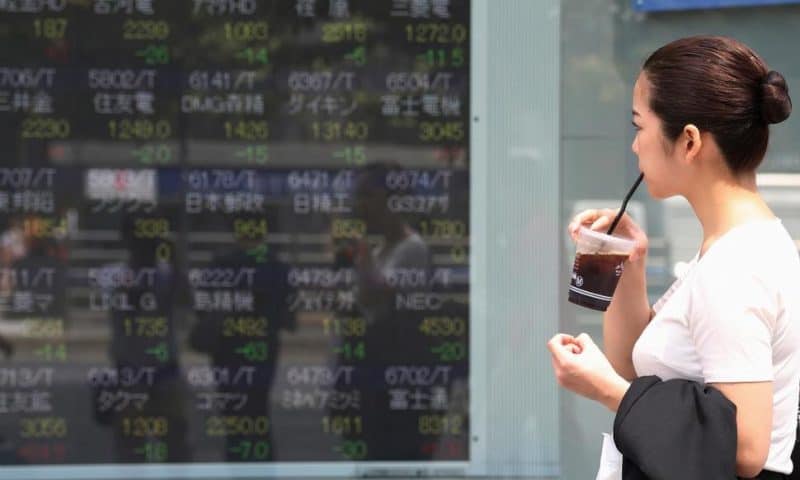European stocks up, Asia mixed after US, China step up trade war with new tariff hikes.
FRANKFURT, Germany — European stock markets drifted higher Monday while Asia was mixed after the U.S. and China escalated their war over trade and technology with new tariff increases.
U.S. markets were closed for the Labor Day holiday, draining some of the energy from global trading. Benchmarks in London, Paris and Shanghai advanced. Tokyo and Hong Kong declined.
Markets reacted less strongly to the weekend tariff hikes on billions of dollars of goods than to previous increases. Investors are hoping for progress in talks this month, but analysts warn the fight over trade and technology is unlikely to be quickly resolved.
“The short-lived truce will probably provide limited relief,” said Zhu Huani of Mizuho Bank in a report. “Businesses have become increasingly uncertain about future prospects, evidenced by the pullback in business investment amidst growing concerns on growth.”
The broad Europe STOXX 600 rose 0.3 percent to 380.55, London’s FTSE 100 rose 1.11% to 7,286.86 and France’s CAC 40 added 0.2% to 5,487.66. Germany’s DAX was 0.1% higher at 11,949.22.
In Asia, the Shanghai Composite Index gained 1.3% to 2,924.11 while Tokyo’s Nikkei 225 shed 0.4% to 20,620.19. Hong Kong’s Hang Seng lost 0.4% to 25,626.55. Seoul’s Kospi ended 1 point higher at 1,969.19 and Sydney’s S&P-ASX 200 retreated 0.4% to 6,579.40. New Zealand and Taiwan gained while Southeast Asia markets retreated.
On Sunday, the United States started charging 15% tax on about $112 billion of Chinese imports. China responded by charging taxes of 10% and 5% on a list of American goods. Negotiators are due to meet this month in Washington but neither side has given any sign it might offer concessions.
The U.S. is pressing China to narrow its trade surplus and roll back plans for government-led creation of companies that can compete globally in robotics and other industries. China’s trading partners say those violate its free-trade obligations and are based on stealing or pressuring companies to hand over technology.
On Wall Street, stocks ended little changed Friday after a listless day of trading ahead of a holiday weekend. The market closed out August with its second monthly decline this year, after May. The S&P 500 index rose 0.1% to 2,926.46. The Dow Jones Industrial Average gained 0.2% to 26,403.28. The Nasdaq slid 0.1% to 7,962.88.
Two surveys of Chinese factory activity showed demand is weak amid the trade war. The business magazine Caixin said its monthly purchasing managers’ index showed activity edging up, but a gauge of new orders fell to its lowest level this year. A separate survey by an industry group, the China Federation of Logistics & Purchasing, showed activity declining. It said demand was “relatively weak.”
EUROPE INDUSTRY: In the eurozone, the August purchasing manager’s index in manufacturing came in at 47.0, indicating continuing contraction. Data compiler IHS Markit said production and new orders continue to fall as confidence hits the lowest level since November 2012. Europe’s industrial slump, a byproduct of slowing global trade and the U.S.-China conflict, is one reason the European Central Bank is expected to announce new stimulus measures at its Sept. 12 meeting.
ENERGY: Benchmark U.S. crude lost 31 cents to $54.79 per barrel in electronic trading on the New York Mercantile Exchange. Brent crude, used to price international oils, retreated 67 cents to $57.79 per barrel in London.
CURRENCY: The dollar fell 0.03 percent to 106.26 yen. The euro declined to $1.0967.

